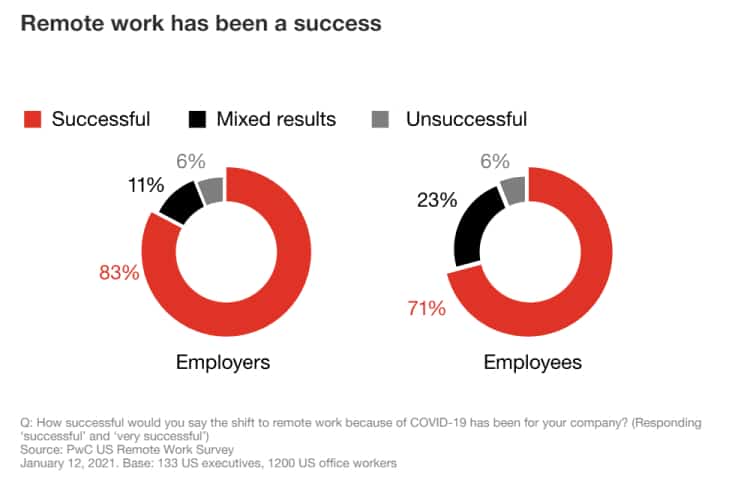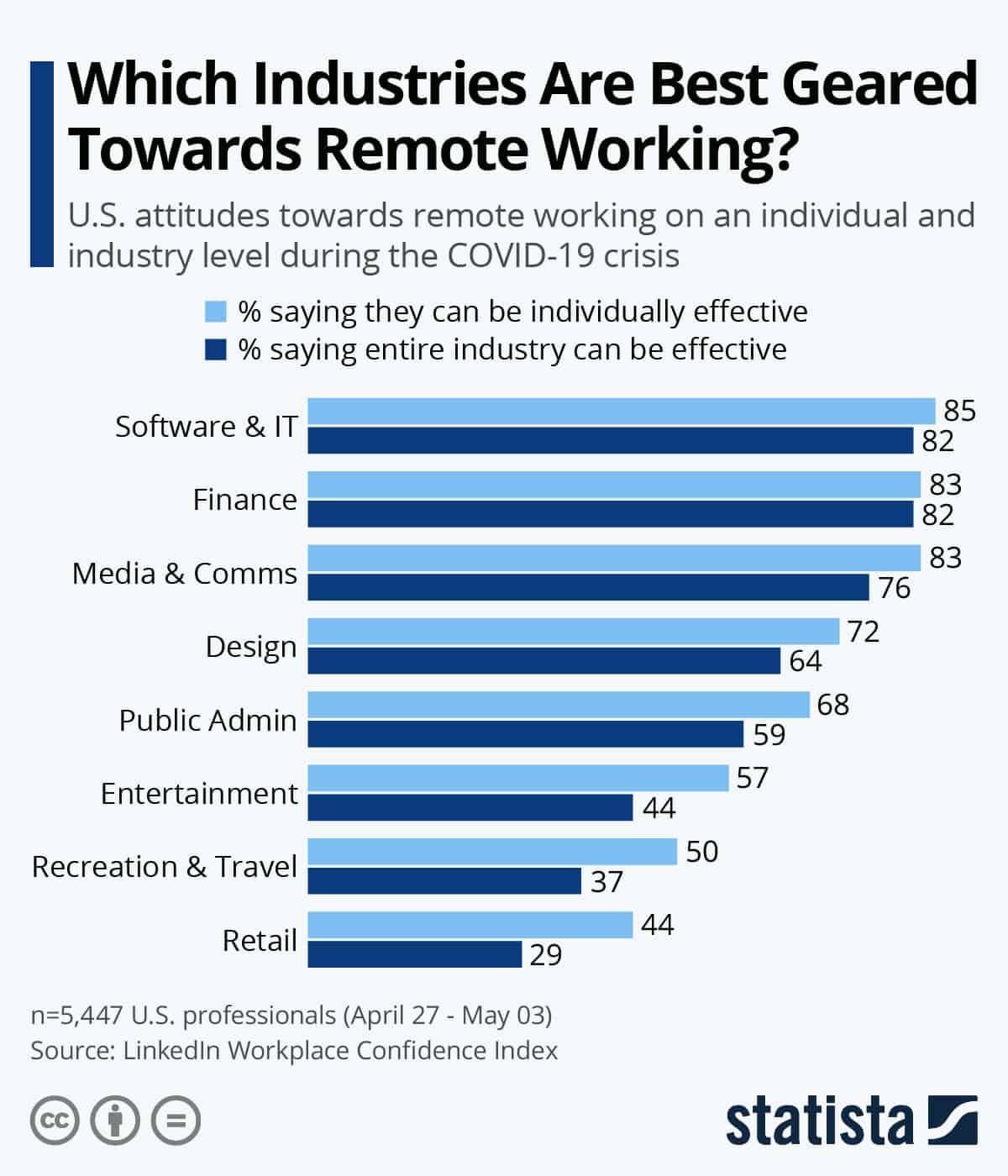
"Rather than telling our employees how they should work, we ask them what they need in order to be happy at work."
“Rather than telling our employees how they should work, we ask them what they need in order to be happy at work.”
This statement was made by an HR Leader of an Austrian global tech company I was interviewing a couple of months before founding worlk. I and my co-founders had been talking to many different CEOs, HR Directors, as well as employees during this period on the topic of remote work and at home working.
What is Remote Work?
Remote work refers to any work that is done without the employee having to commute to a place of work such as an office building or a store.
There are different types of remote work such as:
- Home office or at home working where the employee instead of working from a central office space is working from his home.
- Coworking spaces which are similar to central office spaces as employees still have to commute there. In contrast to office work, however, multiple companies or freelancers share space.
- Workation which as the name implies combines working and vacation. Employees usually don’t have an office space but do their work remotely from any place that has an internet connection.
- Desk Sharing where companies can share unused office space with each other, allowing employees to work from different premises not owned by their employer.
Remote Working Has Been a Success
Since the start of the pandemic, many studies had been conducted on the impact on company performance of remote working models versus traditional working models and overall the results draw a very positive picture.

From my interviews, I honestly can’t recall a single interviewee saying that performance plummeted while employees were working remotely. Now, the pandemic has forced many companies to accelerate change, and obviously not every industry is equally geared towards remote working. While software companies almost didn’t lose a step when switching to this working model, other industries such as retail naturally struggled to maintain performance. But still, I personally know many companies in Austria and Germany that enforced office work as much as possible during the pandemic without having a really good reason for doing so.

“I know what working in very traditional hierarchies feels like. In those companies, people need to see you working physically to get the feeling that you are actually working.”
Why keep companies enforcing office work?
A study conducted by Owl labs found that 44% of companies do not allow remote work in any shape or form. Again, that 44% also comprise organizations that are unable to switch to remote work such as supermarket chains but still, this number baffled me. And I am certain, that among that 44% are many companies that with some effort would be able to establish hybrid working models.
So, it seems there are other forces at work here 🤔
- Old Hierarchies: A CEO of a very progressive and innovative software engineering company explained to me just a couple of days ago: “I know what working in very traditional hierarchies feels like. In those companies, people need to see you working physically to get the feeling that you are actually working.” He further elaborated that in such organizations employees would not even ask for remote working because they know that – even if approved – it would not reflect well on them.
- Fear of Losing Control: A Forbes article from 2021 (source) paints a very daunting picture: “The job of middle and senior managers is to crack the whip and ensure everyone is earning their pay. Many supervisors enjoy the power they lord over you. ” I honestly believe that the whip-cracking mid-level manager is a dying species. At least in organizations that rely on attracting top-level talent. So I am not sure if I would agree with this perception, but the fear of losing control is something managers have to overcome. It’s to an extent understandable and requires a leap of faith. But let’s be real: if your employees fail to work efficiently remotely you probably didn’t do a good job managing and developing them. This is a moment of truth for many managers.
- No Team-Building Opportunities: One very widespread concern and a challenge for basically every type of company is the fear of failing to establish a corporate culture due to at home working and people not meeting face to face anymore. Now, this is a concern that has to be taken very seriously. It’s important for organizations that their members bond with each other and feel like they belong to something bigger than themselves. It simply motivates to know that you are working towards a common goal and share similar values. At least it is important to me. That’s why many companies are moving towards hybrid working models, mixing remote and office work. And companies are very creative in their approaches. For example, I had one HR manager telling me that the HR team would regularly cook for the whole company to convince employees to come to the office more frequently. According to this person this initiative didn’t have the desired effect, I hope it was not because of the HR team’s culinary skills. But the general approach of turning office days into special events is in my opinion the right thinking. Because let’s be honest: for most of us getting to an office work space requires a lot of time and effort. Commuting is not how we want to spend our time on this planet. So there better be a good reason to come to the office. If you then just do the same things as if you were working at home, well no wonder employees prefer staying at home in the first place.
- Expensive Real Estate: It probably gives many CFOs teary eyes when they see all their beautiful and expensive office space unused. By the way, if you are one of those companies with plenty of unused office space you should really consider signing up to worlk.

“We encourage it because they will learn new things, meet new people, and make new experiences. And when they come back along with them they will bring innovation.”
Why Your Company Should Embrace Remote Working
Rather than fearing remote work, companies should embrace it because if done right, remote working comes along with many benefits:
- Happier Employees: The study conducted by Owl Lab clearly indicates that working from home simply improves employees’ life quality. And happier employees are more productive and have a positive impact on an organization’s culture.
- Remote Working Empowers Your Employees: How do you want to grow the leaders of tomorrow if you don’t even trust them to manage themselves? Research indicates that one of the effects of companies allowing remote working is that the employees feel like the company trusts them.
- New Experiences Are an Opportunity to Learn: One CEO put it quite beautifully when asked how he thinks about his employees combining travel and work: “We encourage it because they will learn new things, meet new people, and make new experiences. And when they come back along with them they will bring innovation.”
- It Saves Money: That’s something for our poor crying CFO. It can save a ton of money if you no longer need huge office spaces. Globally, 16% of companies have already gone fully remote (source) and this number is growing.
- Happy Employees: Did I already mention that having happy employees is actually kind of a good thing?

Join worlk
How can worlk help your company reaping the benefits of remote working? worlk is a business community that shares desks, flats, and culture. It allows employees to work from anywhere in the world at minimum costs, and it makes the process for HR teams smooth and easy. Find out more and join worlk today http://www.worlk.com